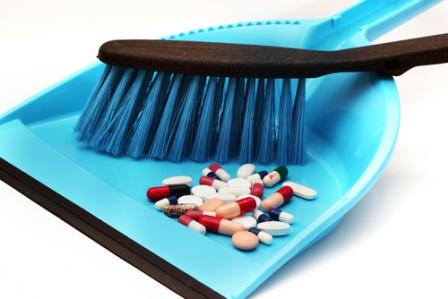Does your medicine cabinet look like the pharmacy aisle at Target? Many of us collect medications throughout the years, without thoroughly cleaning out our cabinets. It’s important to discard unused and expired medications as soon as they are no longer needed, whether they are prescription or over-the-counter, in order to prevent accidental ingestion or exposure by other adults, children, or pets.
But how do you correctly discard them? Do you flush them down the toilet or your bathroom sink? Do you throw them in the trash? Do you use it in your next recipe when your in-laws come over? OK, all joking aside (at least I hope you were joking), the former two are the top methods used by most households to dispose of medications … and not necessarily the proper ways. Let’s find out why these methods can be just as harmful as poisoning your in-laws, and learn tips on how to correctly discard medications.
What’s Wrong With Throwing Your Medications in the Trash?
Trash can be handled by living beings—whether adults, children, or pets. And unfortunately, if some medications are ingested by those it’s not intended for, they can be harmful—whether accidental or intentional. Disposing of medications in the trash (or via the toilet) should be a last resort if there are no other community discarding options available to you. You may also want to check with your local law enforcement to determine if discarding of medications in your trash is legal in your area.
Here are instructions from the FDA on how to properly dispose of medications in your trash (if your city or community does not have any other way to dispose of them):
1. Mix medicines (do not crush tablets or capsules) with an unpalatable substance such as dirt, kitty litter, or used coffee grounds;
2. Place the mixture in a container such as a sealed plastic bag;
3. Throw the container in your household trash;
4. Scratch out all personal information on the prescription label of your empty pill bottle or empty medicine packaging to make it unreadable, then dispose of the container.
What’s Wrong With Flushing Them Down the Toilet or Sink?
Doing so causes minute amounts of the drug to enter our local lakes, streams, and rivers, and hence, it can also enter our drinking water supply. Although drinking water contains a very trace amount of these drug residues, studies so far do not show any harm. But our goal is still to prevent this from happening as much as humanly possible; let's do what we can to protect our environment.
If there is no other way to locally dispose of medications in your area, certain medications may be flushed down our toilet or sink, and are labeled as such (either on the bottle or with the patient info inserts that accompany the medications when filled by your pharmacy). In fact, certain high risk medications (like some narcotics) may be preferably flushed, rather than thrown in the trash, since they can be life-threatening if ingested even once (even if in kitty litter) by a pet or child. Here’s a link to that current list of medications that are deemed flushable.
How to Properly Discard of Medications
1. Read the drug label or patient info leaflet dispensed by your pharmacy for instructions on how to safely dispose of your specific medications. If you have discarded the leaflet or are unable to locate it, medication labels and instructions on disposal for each drug can also be found on the following website.
2. Contact your local (often City or County) waste management program to inquire about your locally specific options—this number may be found on your trash or utility bills, or can be searched online by simply typing the name of your city and then then words “waste management” right after.
3. Contact your local DEA-authorized collector—these are licensed entities (such as pharmacies, hospitals, or law enforcement sites) that collect medications on behalf of the DEA. You can search your local DEA-authorized disposal site using the following link.
4. Contact your local law enforcement—they may be able to guide you on how to access community medicine take-back programs in your area.
5. Contact your local pharmacy—they may also be able to guide you on your options for discarding medications safely.
Note: These rules apply to all medications, including over-the-counter, liquids, inhalers, injectables, and medicated patches.
Share your ideas and learn more quick and dirty tips with us on the House Call Doctor’s Facebook and Twitter pages! You can even find me on Pinterest.
Please note that all content here is strictly for informational purposes only. This content does not substitute any medical advice, and does not replace any medical judgment or reasoning by your own personal health provider. Please always seek a licensed physician in your area regarding all health related questions and issues.
Trash pills image courtesy of Shutterstock.
Tidak ada komentar:
Posting Komentar